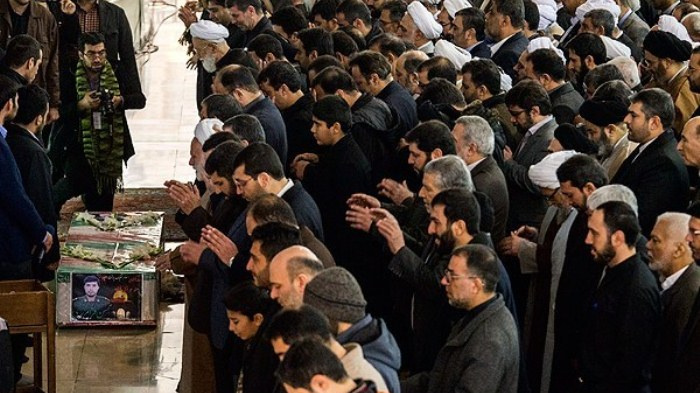Iran’s Friday Prayers: Unity, sedition, election

(Ayatollah Emami Kashani and his congregation praying over the body of Mohsen Faramarzi, Revolutionary Guards' member recently killed in Syria. Faramarzi previously served as Ayatollah Kashani's bodyguard. Photo: Hamed Malekpour/Tasnim)
Across Iran, Friday prayers’ leaders addressed three key issues: Shia-Sunni unity, upcoming elections and fetneh (sedition).
Since the 1979 Islamic Revolution, 12th to 17th of Rabi’ al-Awwal, the days which mark the birth of the prophet of Islam Muhammad according to Sunnis and Shias respectively, is dubbed Islamic Unity week according to an order by the founder of the Islamic Republic Ayatollah Khomeini, a man whose discourse was strongly supra-sectarian. Sermonizers across Iran spoke of the need for unity between Shias and Sunnis, stressing the necessity in the current volatile conditions of the region. In Zahedan, center of Sistan and Baluchistan Province with a mixed population of Shias and Sunnis, Ayatollah Soleymani, called unity “the factor which prevents emergence of sectarian and ethnic tensions in society.” In the largely Sunni province of Kurdistan located in western Iran, Mamosta Abdurrahman Khodaei, Friday prayers’ leader in Sanandaj, also called the unity of Shias and Sunni the key to defeating the “enemies of Islam”. In Tehran, the vocal Ayatollah Ahmad Jannati slammed leaders of Muslim countries for being oblivious towards unity, invoking God’s wrath for tolerating all kinds of indignity while they possess rich oil resources and a 1.5 billion population.
Ayatollah Jannati also used the occasion to remind the audience of the need to show unity against fetneh, sedition, the term used in official discourse to describe the 2009 post-election protests and the Green Movement. A few days before the anniversary of 9th of Dey (December 30) and massive protests against the Green Movement, the octogenarian ayatollah warned about underestimating the ‘sedition’ and called for continued vigilance so no similar uprisings would take place anymore. In Qom, Hojjatoleslam Mohammad Saeidi called ‘sedition’ a “social crime” worse than murder, while in Kerman, Friday prayers’ leader Hojjatoleslam Sabahi called the 2009 protests “an excuse to attack the foundations of the establishment.” In Bojnourd, in the northeast of the country and center of Northern Khorasan Province, accused the 2009 protestors of attempting to “destroy the revolution and the establishment with their misguided slogans and demonstrations.”
The most important subject of the week was elections however. Ayatollah Jannati, who presides the Guardian Council, the body in charge of filtering the qualified candidates for elections whose conduct has been the subject of constant criticism by the Reformists, questioned the reason behind the significant rise of citizens who have registered for candidacy in both the parliamentary and Council of Experts’ elections. He also responded to criticisms about the Guardian Council’s disqualification of nominees. “I don’t know where this culture [/trend] is coming from,” he said. “Some argue that people are the ones who should qualify the candidates.” Jannati added that such claims mean that law should be put aside in favor of the people’s decision, “something that is done nowhere in the world.” In Mashad, Ayatollah Alamolhoda also warned about ‘infiltrators’, pointing to political currents which have returned thanks to the open political climate and aim to carry out their plan by entering the parliament.

